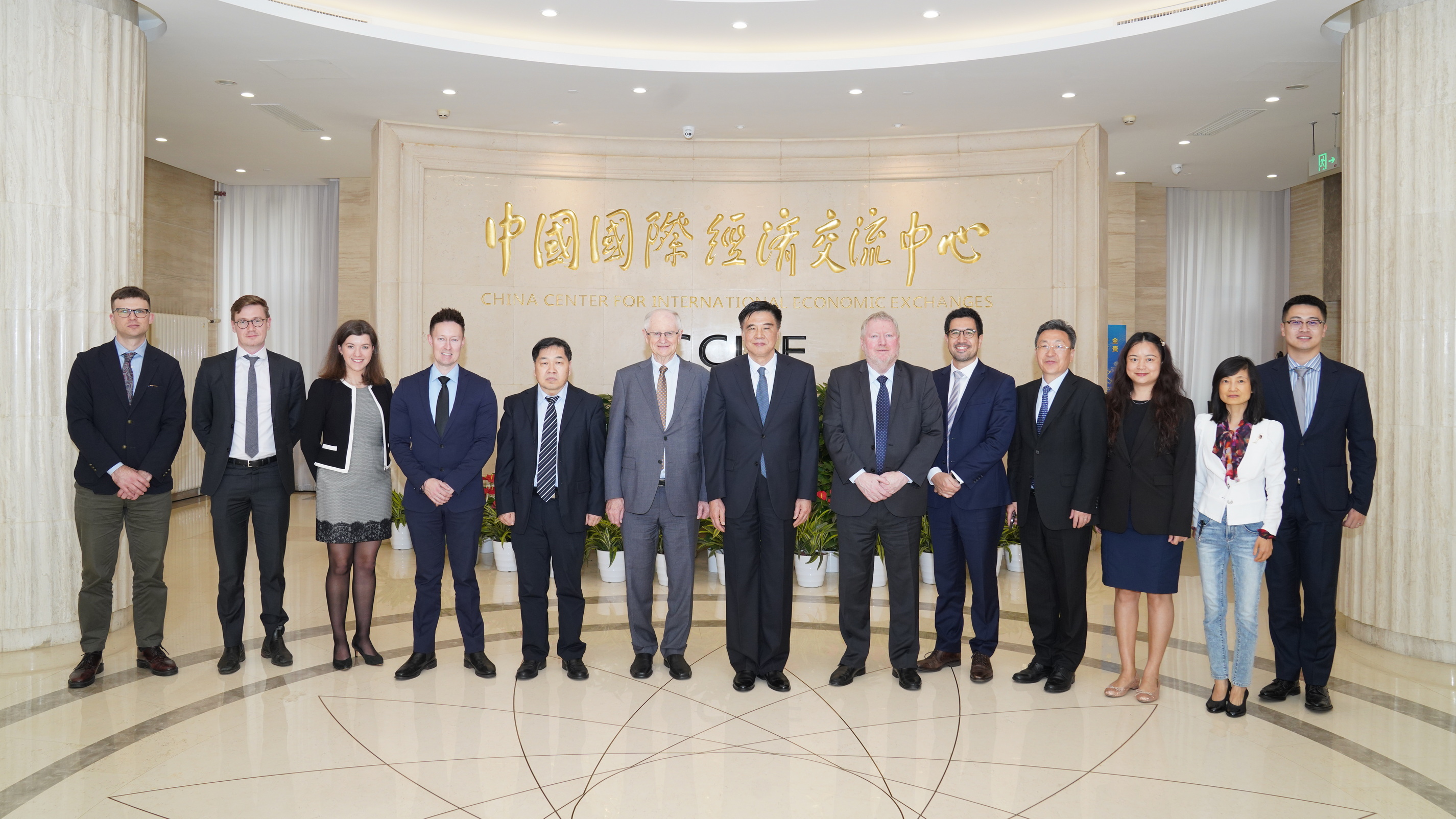CCIEE Held the Australia-China Round Table Exchange
- Time:2023-05-29
- source:CCIEE
On May 24th, 2023, the China Center for International Economic Exchanges (CCIEE) and the Australian National University held a Australia-China roundtable exchange meeting. Experts and scholars participating in the meeting conducted exchanges and discussions on the two topics of "Climate Change and Energy Transformation" and "RCEP and Regional Cooperation Initiatives."

Zhang Xiaoqiang, executive vice chairman and director of the board of executives of CCIEE, and Peter Drysdale, Professor of the Australian National University, delivered opening speeches respectively. Zhang Xiaoqiang pointed out that President Xi Jinping announced at the 75th UN General Assembly that China will strive to achieve the goal of peaking carbon emissions before 2030 and achieving carbon neutrality before 2060, which reflects China's responsibility as a major country. In recent years, China's renewable energy has developed rapidly, with the installed scale of wind power and photovoltaic power generation ranking first in the world. Accelerating the energy transformation process requires joint efforts from all parties, while also ensuring energy security and meeting people's livelihood and development needs. RCEP, with its prominent feature of shared development, is becoming an important carrier for continuously releasing regional development dividends. It is hoped that both sides will effectively implement the important consensus reached by the leaders of China and Australia at their meeting in Bali last year and make greater contributions to the well-being of the two peoples and regional peace, stability and prosperity. Peter Drysdale said that to deal with climate change and maintain the multilateral trading system, China and Australia need to achieve smooth transformation in their industrial and investment frameworks. Over the years, the Australian National University and the CCIEE have played a unique role as a think tank in the development of bilateral relations by conducting joint academic research and publishing research reports. It is hoped that further cooperation can be strengthened to contribute to the development of relations between the two countries.

Chinese scholars believe that from the perspective of energy consumption structure, China has made significant progress in energy transition, with a noticeable increase in the proportion of renewable energy consumption. Green bonds and green loans are the most important pillars of the entire green financial system. China has played a crucial role in green transformation and reducing climate change risks by establishing a multi-tiered green financial system.China has become a crucial part of the global trade value chain. Introducing more geopolitical and ideological factors into the industrial chain would seriously disrupt global industrial chain and supply chain cooperation. Safeguarding global industrial division of labor and cooperation requires joint efforts from all countries.
RCEP has greatly enhanced the level of institutional openness in the Asia-Pacific region, and applying for membership in the CPTPP (Comprehensive and Progressive Agreement for Trans-Pacific Partnership) will further enhance China's level of institutional openness.
Australian scholars believe that to achieve carbon neutrality goals, Australia and China can collaborate on green financing and sustainable investment standards, which would support the green transformation process. Addressing trust deficits between regions requires the establishment of more comprehensive multilateral rules to effectively manage differences. Regional economic cooperation initiatives like RCEP have effectively promoted economic development and trade prosperity among regional countries. China's application to join the higher-standard CPTPP will further contribute to the convergence and integration of international trade rules and standards.
Zhang Yongjun, deputy chief economist of CCIEE, Bu Yongxiang, deputy head of the Financial Research Institute of the People's Bank of China, Zhang Monan, deputy head of Insitute of American and European Studies, CCIEE, and Li Haodong, assistant researcher of Department of the World Economy Studies, CCIEE, attended the meeting and delivered speeches. Xu Chaoyou, head of the Department of International Exchange and Cooperation, CCIEE, chaired the meeting. Foreign guests such as Armstrong, Director of the Institute of East Asian Studies at the Australian National University, and researchers Teges, Cowler, and Gammon attended the meeting and delivered speeches. Representatives from the Ministry of Foreign Affairs and the Ministry of Commerce of China and Fan Siming, Minister Counselor of the Australian Embassy in China, attended the meeting.
